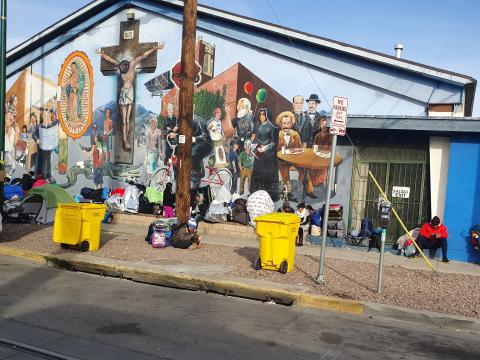
Maryknoll Office for Global Concerns joined 164 other faith-based organizations in writing to President Biden, Vice President Harris, Secretary Mayorkas, and Secretary Blinken to express concerns over new immigration rules that could restrict access for some people to their rights to seek asylum.
Read the full letter as a PDF.
January 23, 2023
Dear President Biden, Vice President Harris, Secretary Mayorkas and Secretary Blinken:
As 165 faith-based organizations and congregations across traditions, we write with grave concern about the forthcoming Notice of Proposed Rulemaking (NPRM) that will set in motion an asylum ban in the form of a rule that bars people from asylum if they enter without inspection or do not seek protection in countries of transit. While we recognize your announcement included an action to expand limited pathways to Venezuelans, Cubans, Haitians, and Nicaraguans for humanitarian reasons, the parole process is not an equivalent substitute for access to asylum — nor should it ever be coupled with an expansion of harmful anti-asylum policies like Title 42. The United States has a long history of providing safety for those fleeing violence and persecution in their homelands. We urge you to not issue the proposed NPRM and to instead work vigorously across your administration to ensure that people seeking safety have access to a fair, dignified and efficient asylum process.
We recognize that there are real challenges at the U.S.-Mexico border and the U.S. asylum system is in dire need of meaningful reform. This must be met with a moral and human-centered response. Across faith traditions and practices, the message is clear: We are called by our sacred texts and faith principles to approach one another with love—not fear. Our diverse faith traditions compel us to love our neighbor, accompany the vulnerable, and welcome the sojourner—regardless of place of birth, religion, or ethnicity. Importantly, our faiths also urge us to boldly resist and dismantle systems of oppression. Implementation of the new rule will not only be ineffective, but also harmful, inhumane, and deadly for the most vulnerable. Rooted and renewed in our collective faith teachings and values, we are called to ensure that our laws promote and protect the dignity of each individual. This means critically addressing unjust and oppressive public policies and their negative impacts on human lives.
The NPRM was announced in conjunction with a limited expansion of the temporary parole process for humanitarian reasons to Haitians, Cubans, Nicaraguans, and Venezuelans living abroad. Yet for many, migrating is not a choice, but a matter of survival. As evidenced by similar versions of an asylum transit ban under the Trump administration, curtailing access to asylum leads to serious human consequences and violates our moral and legal obligations to those fleeing violence and persecution. President Trump’s asylum transit ban led to asylum denials and prolonged detention for many with bona fide claims, as well as family separations, permanent limbo, and elimination of a pathway to citizenship for refugees barred from asylum and granted only the inadequate protection of withholding of removal. The Trump administration issued a similar rule in December 2020, and then was blocked by a U.S. District Court judge in February 2021. The court determined that the Trump administration’s rule was inconsistent with existing asylum law and increased the risk that asylum applicants would be subject to violence. Following in these flawed footsteps leads the U.S. further down a dangerous path that wrongfully places the emphasis on punitive measures, deterrence, detention, and deportation rather than meaningful access to protection.
In addition, the United Nations High Commissioner for Refugees warned that linking safe pathways with the curtailment of access to asylum is inconsistent with refugee law, stressing that “such initiatives…cannot come at the expense of the fundamental human right to seek asylum.” Furthermore, these actions contradict a clear commitment under the Los Angeles Declaration on Migration and Protection to “protecting the safety and dignity of all migrants, refugees, asylum seekers, and stateless persons, regardless of their migratory status.”
Many of our congregations, synagogues, and mosques have encouraged us with their accompaniment of refugees and asylum seekers. They have faithfully provided assistance, temporary shelter, food and basic necessities, as well as support navigating U.S. culture and systems. We are sustained by their encouragement and the opportunity to live out our faith principles. Their deep involvement and commitment is also a demonstration of the public support for ensuring asylum seekers have access to a dignified welcome. Nearly three-quarters of Americans (73.4%) agree that the United States should provide access to the U.S. asylum system to people fleeing persecution and/or violence, according to a recent poll conducted by the U.S. Immigration Policy Center (USIPC) at the University of California, San Diego.
As representatives from the faith community, we denounce any policy that prevents or curtails access to the right to seek protection for asylum seekers and other vulnerable populations. President Biden boldly proclaimed during his campaign that, “We're going to restore our moral standing in the world and our historic role as a safe haven for refugees and asylum-seekers." Words are just words until they are followed by substantive and meaningful action. We urge your administration to withdraw any asylum ban (including an asylum transit ban) from consideration, and instead live out our moral call to restore asylum protections and care for those fleeing oppression and persecution.
See the complete list of signatories here. Maryknoll OGC photo of Mural behind Sacred Heart Church, El Paso, Texas
